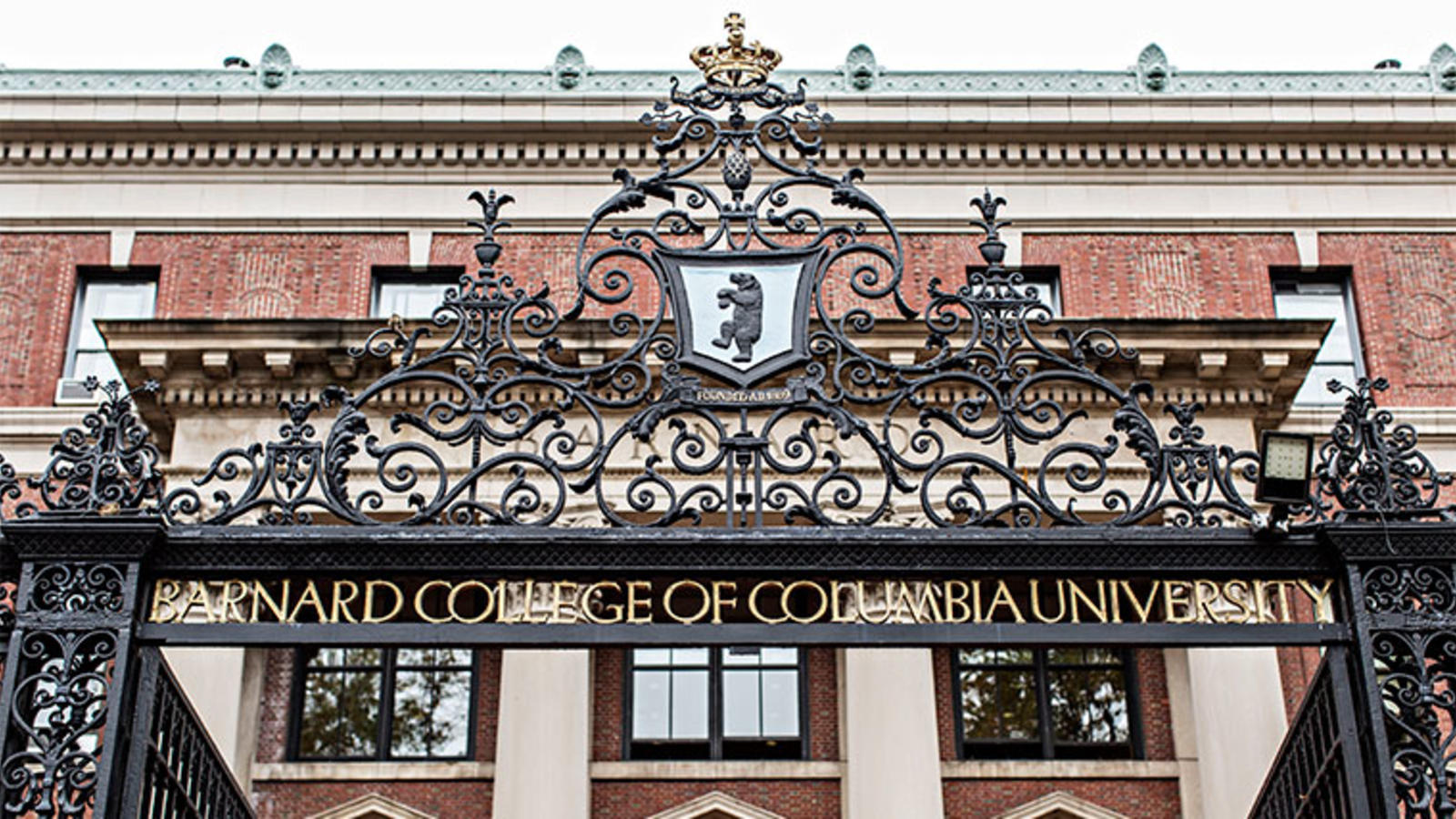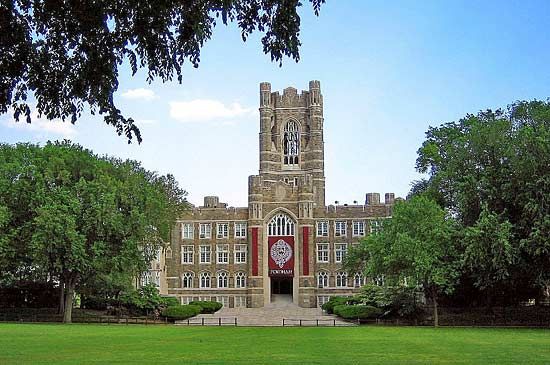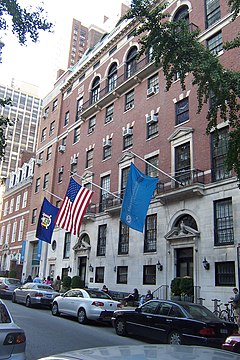Choosing the right college can be daunting, especially in a city as vast and diverse as New York. While more prominent universities often come to mind when considering higher education options, small colleges in New York City offer unique benefits and opportunities.
This article will explore some of the top small colleges in New York City in 2023 and what makes them stand out. Whether you’re looking for an intimate classroom setting, specialized programs, or a strong sense of community, a small college in New York City can meet your needs.
So if you’re considering applying to college in the Big Apple, read on to discover some of the best small colleges in New York City to use in 2023.

Table of contents
- 10 small colleges in New York City in 2023
- What are the admission requirements for small colleges in New York City?
- Are any scholarships available for students applying to small colleges in New York City?
- How does the cost of attending a small college in New York City compare to more prominent universities?
- What are the majors offered at small colleges in New York City?
- Can students who attend small colleges in New York City still have access to internship and job opportunities?
- How do small colleges in New York City compare to more prominent universities regarding academics and campus life?
- What is the student-to-faculty ratio at small colleges in New York City?
- Are there any unique programs or initiatives offered at small colleges in New York City?
- Frequently Asked Questions
- Conclusion
- References
- Recommendations
10 small colleges in New York City in 2023
#1. Barnard College

This women’s liberal arts college is affiliated with Columbia University and offers a range of undergraduate programs in the arts, humanities, social sciences, and sciences.
See also: 13 Best Catholic Colleges In The World
#2. The Cooper Union
This highly selective college offers undergraduate art, architecture, and undergraduate engineering programs and provides full-tuition scholarships to all admitted students.
#3. The New School
This private university offers a range of undergraduate and graduate programs in the arts, social sciences, and humanities, as well as specialized programs in design and media studies.
You should read: 10 Best Colleges For Orthodontists In 2023
#4. Eugene Lang College of Liberal Arts at The New School
This college within The New School offers a liberal arts education focusing on critical thinking and social justice and allows students to design their interdisciplinary majors.
#5. Fordham University

This Jesuit university offers undergraduate and graduate programs in the arts, humanities, social sciences, and sciences and professional programs in law, business, and social work.
See also: 15 Esthetician Schools Online 2023: Courses, Schools & Certification.
#6. Marymount Manhattan College

This private liberal arts college offers undergraduate programs in the arts, humanities, social sciences, and sciences and specialized programs in areas such as dance and theatre.
#7. Pratt Institute
This private art and design college offers undergraduate and graduate architecture, fine arts, and graphic design programs. It has a strong emphasis on hands-on learning and professional development.
Check out: How To Create A .edu Email Account For Free In 2023
#8. St. Francis College
This private college offers undergraduate programs in the liberal arts and sciences and professional programs in areas such as business and education.
#9. The King’s College
This Christian college offers undergraduate programs in areas such as politics, economics, and media and strongly emphasizes the integration of faith and learning.
You should read: 4 Weeks Certificate Program That Will Pay You Well In 2023
#10. Wagner College

This private college offers undergraduate programs in the liberal arts and sciences and professional programs in areas such as nursing and business. It has a strong focus on experiential learning and community engagement.
See also: Top 15 Quick Certifications That Pay Well In 2023
What are the admission requirements for small colleges in New York City?
Admission requirements for small colleges in New York City can vary from institution to institution. However, here are some general conditions that may be applicable:
- High school diploma or equivalent: Most colleges require that applicants have a high school diploma or equivalent, such as a GED.
- Transcripts: Applicants must submit official transcripts from their high school and any previous colleges they attended.
- Standardized test scores: Many colleges require standardized tests like the SAT or ACT. Some colleges may also require scores from additional tests, such as SAT subject tests or the TOEFL for international students.
- Application fee: Most colleges require an application fee at the time of application.
- Essays: Many colleges require essays or personal statements as part of the application process.
- Letters of recommendation: Some colleges require letters of recommendation from teachers, counselors, or others who can speak to the applicant’s academic or personal qualities.
- Interviews: Some colleges may require or strongly recommend interviews as part of the application process.
It’s important to note that each college may have unique requirements and policies, so it’s always best to check directly with the colleges you are interested in attending to learn about their specific admission requirements.
Check out: Full List of Best SPP Colleges in Canada | 2023
Are any scholarships available for students applying to small colleges in New York City?
Yes, scholarships are available for students applying to small colleges in New York City. Here are some options:
Merit-based scholarships
Many small colleges in New York City offer merit-based scholarships to students with outstanding academic achievements, extracurricular activities, or other exceptional qualities. These scholarships are usually awarded based on a student’s application and do not require a separate process.
Need-based scholarships
Some colleges offer need-based scholarships to students who demonstrate financial need. To be considered for these scholarships, students must complete the Free Application for Federal Student Aid (FAFSA) or the College Scholarship Service (CSS) Profile.
It will help if you read: Cheapest MBBS Universities And Colleges In The World 2023 [UPDATED]
Diversity scholarships
Some colleges offer scholarships to students who bring diversity to their campus. These scholarships may be based on a student’s race, ethnicity, gender, sexual orientation, or other factors.
External scholarship
Many external scholarships are also available to students applying to colleges in New York City. Non-profit organizations, corporations, or other entities may offer these scholarships.
It’s essential to research the scholarship opportunities available at each college you are interested in applying to, as well as external scholarship opportunities, and to submit applications for any scholarships you are eligible for. Additionally, you should always carefully review the requirements and deadlines for each scholarship opportunity.
Check out: 20 Cute College Mascots In The USA 2023 | Pictures
How does the cost of attending a small college in New York City compare to more prominent universities?
The cost of attending a small college in New York City can vary depending on the institution. Still, small colleges may have lower tuition and fees than more prominent universities. However, other factors such as room and board, transportation, and personal expenses can also impact the overall cost of attendance.
Small colleges may have lower tuition and fees because they typically have smaller classes, fewer academic programs, and lower administrative costs than more prominent universities. This can make them more cost-effective for students who want a more personalized educational experience.
On the other hand, more prominent universities may have more resources and a more comprehensive range of academic programs and services, but these benefits may come at a higher cost. Additionally, more prominent universities may have a higher cost of living in the surrounding area, which can also impact the overall cost of attendance.
It’s essential to carefully consider the costs and benefits of attending a small college versus a more prominent university in New York City and explore all available financial aid and scholarship options to help offset the cost of attendance.
You should read 17 Best Computer Engineering Colleges, Tuition, Acceptance rate.
What are the majors offered at small colleges in New York City?
Small colleges in New York City may offer a variety of majors across different fields. Here are some examples of common majors that they offer at small colleges in the city:
- Business: Small colleges in New York City may offer majors in accounting, finance, marketing, and management.
- Liberal Arts: Many small colleges in New York City have a solid liberal arts program, offering majors in English, history, philosophy, and political science.
- Health Sciences: Some small colleges may offer nursing, public health, and health administration, majors.
- Education: Small colleges may offer early childhood education, special education, and secondary education majors.
- Social Sciences: Majors in psychology, sociology, anthropology, and economics may be at small colleges in New York City.
- Fine Arts: Small colleges may have vital programs in visual arts, theater, dance, and music.
- STEM: Small colleges may offer majors in science, technology, engineering, and math (STEM) fields, including biology, chemistry, computer science, and engineering.
It’s important to note that each small college may have unique majors and programs. Hence, it’s always best to check directly with the colleges you are interested in attending to learn about their offerings.
See this article: Top 15 Colleges With Gymnastics Scholarships In 2023
Can students who attend small colleges in New York City still have access to internship and job opportunities?
Yes, students attending small colleges in New York City can still access internship and job opportunities. Small colleges offer unique advantages regarding access to internships, job opportunities, and personalized career services.
Small colleges may have close relationships with local businesses and organizations, which can provide opportunities for students to gain hands-on experience through internships, co-op programs, and other forms of experiential learning. Additionally, small colleges may have a more personalized approach to career services, with dedicated staff who can help students explore career paths, prepare for interviews, and connect with potential employers.
In addition to the resources provided by their college, students in New York City also have access to a wide range of internship and job opportunities in various industries,.From finance and business to media and the arts. The city is home to many major corporations, non-profit organizations, and government agencies that offer internships and job opportunities to students.
Check out: 10 Best Colleges for Publishing and Editing in 2023 | Tuition and Admission Requirements
How do small colleges in New York City compare to more prominent universities regarding academics and campus life?
Small colleges in New York City and more prominent universities each offer unique benefits and drawbacks regarding academics and campus life.
Regarding academics, small colleges in New York City often have smaller class sizes and a more intimate learning environment. This can allow for more individualized attention and opportunities for close relationships with professors. Additionally, small colleges may have specialized programs and majors unique to their institutions.
On the other hand, more prominent universities in New York City often have a more comprehensive range of academic programs and resources. This includes research facilities and access to distinguished faculty members. More prominent universities may also have more opportunities for interdisciplinary studies and collaborations with other departments.
Regarding campus life, small colleges in New York City often have a stronger sense of community and a more tight-knit student body. This can provide opportunities for more meaningful peer relationships and a more personalized college experience. However, small colleges may have fewer extracurricular activities and resources than larger universities.
Larger universities in New York City often have more diverse student populations and a more comprehensive range of extracurricular activities and resources. This can allow students to explore their interests and pursue their passions outside of the classroom. However, larger universities may feel overwhelming and less personal than smaller colleges.
Ultimately, the decision to attend a small college or a larger university in New York City depends on the individual student’s preferences and priorities. Considering academic programs, campus culture, and personal goals are essential.
See also: 15 Best Colleges For Zoology in the World | Ranking 2023
What is the student-to-faculty ratio at small colleges in New York City?
The student-to-faculty ratio at small colleges in New York City can vary depending on the institution. However, small colleges generally tend to have lower student-to-faculty ratios than larger ones.
A low student-to-faculty ratio can benefit students, allowing for more personalized attention and support from professors. With fewer students in each class, professors can often provide individualized attention, answer questions more thoroughly, and provide more detailed feedback on assignments.
Many small colleges in New York City have student-to-faculty ratios ranging from around 10:1 to 15:1. There are typically about 10 to 15 students for every faculty member at the college. However, some small colleges may have lower student-to-faculty ratios, with ratios as low as 5:1 or lower.
It’s worth noting that a low student-to-faculty ratio is just one factor to consider when evaluating the quality of a college’s academic program. Other factors should also be considered, such as the qualifications and experience of faculty members, the range of educational programs and courses offered, and the availability of resources and support services.
You should read Top 6 Medical Colleges In The USA And Their Tuition fees.
Are there any unique programs or initiatives offered at small colleges in New York City?
Yes, small colleges in New York City may offer unique programs and initiatives that set them apart from more prominent universities. Here are some examples of special programs and initiatives that small colleges in New York City may offer:
Collaborative Research
Some small colleges in New York City may offer opportunities for students to collaborate with faculty on research projects. These projects may focus on topics related to the college’s areas of expertise, such as urban studies, public health, or social justice.
Community Engagement
Many small colleges in New York City prioritize community engagement, encouraging students to get involved in local organizations and initiatives. Some colleges may even require students to complete community service for their degree program.
Check out: Barbizon College Tuition Scholarship Program 2023
Experiential Learning
Small colleges in New York City may offer various experiential learning opportunities, such as internships, co-op programs, service-learning projects, and study abroad programs. These opportunities allow students to gain hands-on experience and apply what they have learned in the classroom to real-world situations.
Innovative Degree Programs
Some small colleges in New York City may offer innovative degree programs that are not offered at larger universities. For example, some colleges may have interdisciplinary majors that combine coursework from multiple disciplines or offer degrees in emerging fields such as sustainability, media studies, or digital marketing.
See also: List of Military Colleges and their Academies in 2023
Diversity and Inclusion
Many small colleges in New York City prioritize diversity and inclusion, offering programs and initiatives to support underrepresented students. These programs may include mentorship programs, affinity groups, and cultural events.
You should read: 15 Best Colleges for Students with Autism | 2023 Rankings
Frequently Asked Questions
The average class size at small colleges in New York City is typically between 15 and 20 students, which allows for more personalized attention and interaction with professors.
Tuition costs at small colleges in New York City can vary, but they are often comparable to or slightly lower than those at larger universities. Additionally, smaller colleges may offer more financial aid and scholarship opportunities.
While small colleges may offer a narrower range of academic programs than larger universities, they often have specialized programs and majors unique to their institutions. Many small colleges in New York City have vital programs in areas such as the arts, humanities, and social sciences.
Attending a small college in New York City can provide students with a more intimate and supportive learning environment and opportunities for close relationships with professors and peers. Small colleges also often have a strong sense of community and offer unique programs and initiatives.
Yes, many small colleges in New York City partner with local businesses and organizations to provide students with internship and job opportunities. Additionally, the city offers a wealth of employment options in various industries, which students at small colleges can take advantage of.
Conclusion
In conclusion, small colleges in New York City offer a unique and valuable option for students looking for a more intimate and personalized educational experience. With their smaller class sizes, specialized programs, and strong sense of community, these colleges allow students to develop close relationships with their peers and professors while pursuing their academic and professional goals.
Whether you’re interested in pursuing the arts, sciences, or humanities, a small college in New York City can meet your needs. So if you’re considering applying to a college in a city that never sleeps, explore the options offered by some of the top small colleges in New York City in 2023. Apply now and take the first step towards a fulfilling and rewarding college experience.
See also: Best Cars For College Students In 2023-2024
References
- https://www.niche.com/colleges/search/best-small-colleges/s/new-york/
- https://www.niche.com/colleges/search/best-small-colleges/m/new-york-city-metro-area/
- https://www.prepler.com/best-small-colleges/new-york
- https://academicinfluence.com/rankings/by-state/new-york/best-small-colleges
Recommendations
- 10 Best Colleges for Publishing and Editing in 2023 | Tuition and Admission Requirements
- 15 Best Colleges For Zoology in the World | Ranking 2023
- Top 6 Medical Colleges In The USA And Their Tuition fees
- Barbizon College Tuition Scholarship Program 2023
- List of Military Colleges and their Academies in 2023
- 15 Best Colleges for Students with Autism | 2023 Rankings



